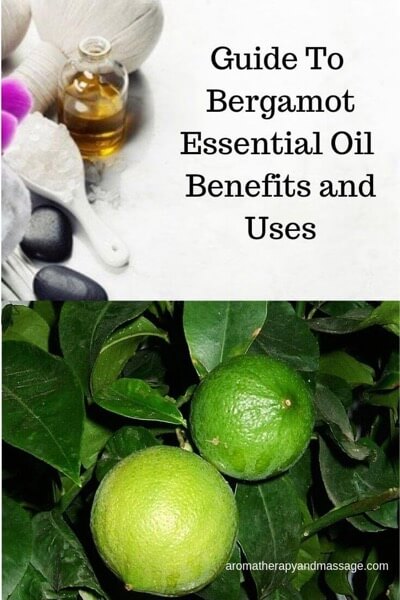- Home
- Essential Oil Profiles
- Bergamot Essential Oil
As an affiliate for Bookshop, Amazon, and other programs, I may earn a small commission for products purchased through links. This doesn't affect the price you pay. Privacy policy and disclosures.
Search this site:
Guide to Bergamot Essential Oil Benefits and Uses
"Bergamot lightens the shadows of the mind, bringing illumination and laughter," writes aromatherapist Valerie Ann Worwood in Aromatherapy For the Soul. Worwood goes on to say the emotional benefits of bergamot essential oil (Citrus bergamia) include encouraging concentration, confidence, balance, strength, joy, and harmony.

Basic Bergamot Facts
Plant family: Rutaceae
Production: Mechanically expressed from the almost-ripe fruit rind. Bergamot is a small, green, inedible citrus fruit.
Aroma: Clean, fresh, citrus.
Perfume/Aromatic note: Top to middle
Is bergamot safe to use during pregnancy? It's OK to diffuse this essential oil as a room freshener, according to Aromatherapy and Massage For Mother and Baby. Probably not for other uses.
Is bergamot essential oil safe for children? Do not use with babies.
Cautions: This essential oil contains bergapten, which is photosensitizing, meaning it makes your skin more sensitive to the sun. However, you can buy bergapten-free bergamot. Look for labels that say bergapten-free or FCF (furanocoumarin free).
If you use an essential oil that's not bergapten-free, be sure to avoid UV light exposure (including tanning beds) for at least 24 hours after applying the oil to your skin.
Do not confuse bergamot (Citrus bergamia) with the different essential oil bergamot mint (Mentha citrata).
Main components:
- (+)-limonene 28.0–45.0%
- linalyl acetate 18.0–28.0%
- linalool 4.0–20.0%
- bergapten 0.11–0.33%*
*The bergapten-free oil contains 0–0.0091% bergapten. See Essential Oil Safety, 2nd Edition, for a complete list of components.
Bergamot Aromatherapy Benefits
Aromatherapy: A Complete Guide to the Healing Art: Bergamot helps enhance immunity, heal wounds and skin growths, and prevent scarring. The scent can reduce stress, depression, anxiety, insomnia, cycles of compulsive behavior. Bergapten-free bergamot essential oil skin benefits most skin conditions. The essential oil also aids digestion, balances emotions, and deodorizes.
The Complete Book of Essential Oils and Aromatherapy: Uses for bergamot essential oil include helping relieve fears, indigestion, wounds, acne, herpes sores, depression, stress, tension, insomnia, and emotional crisis. The oil is emotionally strengthening.
The Encyclopedia of Essential Oils (updated edition): Use bergapten-free bergamot for skin conditions such as acne, boils, eczema, psoriasis, scabies, insect bites, oily complexion, spots, and wounds. Other uses of this essential oil include relief from bad breath, sore throats, flatulence, loss of appetite, colds, fever, flu, anxiety, depression, and stress-related conditions. The oil has a refreshing and uplifting quality.
Aromatherapy For Healing the Spirit: In Traditional Chinese Medicine bergamot disperses stagnant Qi-energy and harmonizes Liver-Qi. This essential oil encourages the release of pent-up feelings and helps in the rediscovery of spontaneity and optimism. The oil's energy is cool and dry and its main element is wood.
Aromatica: A Clinical Guide to Essential Oil Therapeutics, Volume I: Psychologically, bergamot promotes emotional stability and insight and mildly promotes alertness and optimism. Physically, the essential oil balances and harmonizes and is beneficial for oily, congested skin. In Traditional Chinese Medicine the essential function of bergamot is to regulate the Qi and harmonize the Shen. Recommended essential oils to blends with bergamot:
- For stress-related conditions, especially insomnia and anxiety: mandarin.
- For hyperactive, stress-related conditions: lavender.
- For indigestion, bloating, flatulence: rosemary or peppermint.
- The rasa (taste) of bergamot is sweet, sour, astringent; the vipaka (aftertaste) is pungent; and the virya (energy) is heating and drying.
- The oil decreases vata and kapha and increases pitta.
- This essential oil affects all tissues, and its indications include gingivitis, sore throat, cystitis, vaginal itching, fungus, fever, lost appetite, colic, flu, emotional imbalance, depression, acne, psoriasis, and eczema.
Subtle Aromatherapy: This essential oil's green color suggests an affinity for the heart chakra, especially to help relieve grief.
The Essential Guide to Aromatherapy and Vibrational Healing: Spiritually, use bergamot during meditation with the intention to align your awareness with angels, spirit guides, and spiritual master teachers. Mentally, this essential oil clears a foggy mind and helps with focus and clarity. Emotionally, the oil can raise your levels of joy.
Aromatherapy and Subtle Energy Techniques: Bergamot clears and cleanses, brings in positive & optimistic energy, uplifts and calms at the same time, and eases wounds of the heart. Especially useful for the fourth/heart chakra.
The book suggests the following positive mind blend. Use it either in a diffuser or to make a room spray by adding the essential oils to four ounces (1/2 cup) distilled or purified water in a spray mister bottle.
- 4 drops bergamot essential oil
- 4 drops orange essential oil
- 2 drops eucalyptus essential oil
Mixing Essential Oils for Magic: Use bergamot for protection and to help let go of toxic emotions, restore peace after a quarrel, and encourage happiness. The oil also helps open awareness for dreamwork.
Bergamot Essential Oil Uses and Blends
To relieve digestive discomfort, add two or three drops of bergamot essential oil to about one teaspoon of carrier oil. Gently rub the blend onto your abdomen.
Massage Blend for Sleep
Use the following massage oil before going to bed. Or you can add 1 teaspoon of the blend to a warm bath.
- 6 drops bergamot
- 5 drops lavender essential oil
- 5 drops sandalwood essential oil
- 2 drops roman chamomile essential oil
- 1 drop frankincense essential oil
- 1 drop rose essential oil (optional)
- 4 tablespoons carrier oil
Source: Essential Oils & Aromatherapy for Dummies
Soothing Bath
Mix 3 drops each of bergamot, marjoram, and lavender essential oils in a dispersant such as a tablespoon of cream or honey. Add the blend to your bathwater and swish.
Alternatively, add the essential oils to a half cup each of Epsom salt and baking soda to a make a relaxing, skin softening bath salts.
Source: KG Stiles' Essential Oils and Aromatherapy Library
Nighttime Cold Relief
Add the following oils to a one-ounce glass or PET plastic bottle:
- 2 tablespoons jojoba oil
- 5 drops bergamot essential oil
- 5 drops lemon essential oil
- 3 drops roman chamomile essential oil
Shake gently to mix. Shake gently before each use. Apply to the back of your neck, chest, and feet as needed in evenings and at bedtime.
Source: Essential Living
Sink Scrub
- 5 drops bergamot
- 5 drops lime essential oil
- 1/2 cup baking soda
- 1/4 cup hydrogen peroxide
Combine ingredients in a small bowl and stir. Apply the mixture to the inside of
the sink and scrub. Rinse with warm water.
Source: 150 Ways to Use Essential Oils
More aromatherapy cleaning blends.
Buy essential oils: Aromatics International or Rocky Mountain Essential Oils.
Photo Credit: By K reger, CC BY-SA 3.0, via Wikimedia Commons



